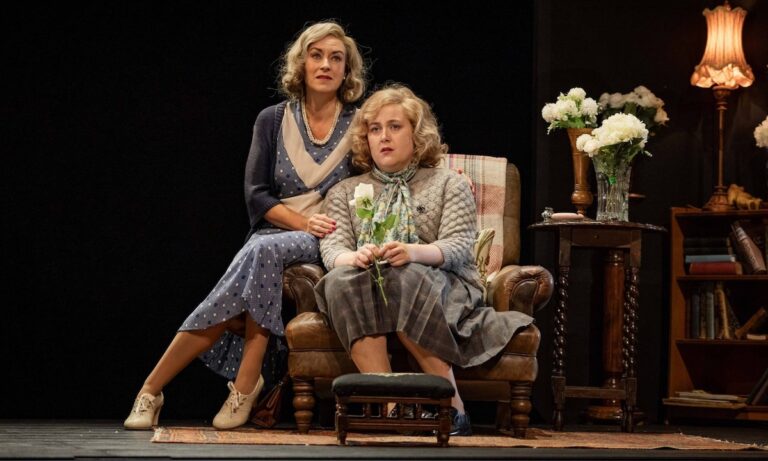Writer: Amy Rosenthal
Director: Richard Beecham
The Mitford sisters – or at least, five of them – have passed into popular culture because of their outspoken and radical views, covering the entire political spectrum. In The Party Girls, we meet Nancy, Diana, Unity, Jessica and Deborah at various points in their lives in an attempt to show us the development of their familial bonds.
Writer Amy Rosenthal has chosen to focus squarely on the girls’ own experiences, so we don’t meet their parents or some of the controversial characters some associated with. The narrative is presented as a series of vignettes that flitn forward and back in time – covering pre-war and the rise of Oswald Mosley’s Blackshirts when Diana and Unity espoused fascism while younger sister Jessica leant towards communism; mid-war, focusing on Jessica’s life as an effectively single mother in America; and their twilight years in France in 1969, when the family is drawn together to help nurse the ailing Nancy.
The quick movements between these periods do require rapid changes of costume and wigs for the sisters to help establish the points on their journeys where we meet them, as well as a slick set from designer Simon Kenny. Kenny’s set includes a detailed set of the room that Jessica and Unity shared as girls that rolls forward and back; in the other periods, we have trucks that roll in and out and also a sumptuous bedroom for 1969. With so many moving parts, it’s perhaps not surprising that occasionally things will slip: on press night, a truck with Joe Coen on board was initially moved the wrong way and its reversal caused a hat stand to topple.
One feels that the scenes in the latter half of the 1930s, set in the family home at Swinbrooke, are the most telling. On one side, we have Unity’s section, emblazoned with pictures of Hitler, with swastikas carved into the glass of the window pane; on the other is Jessica’s, with a bust of Lenin and communist symbols, with the hammer and sickle carved into her window glass. The girls were never sent to school and developed their own slang, which is childishly charming in the 1930s on the lips of their younger selves; it feels anachronistic to still be using a private language as grown women, and maybe that is the point: the sheltered and privileged upbringing of these girls led to their obsessions, which remained childlike throughout their adult lives.
Central to this story, and certainly the most sympathetic character, is Jessica, or Decca. In the early episodes, she seems to be playing with the idea of communism, but her attitudes become set as we see her working in America, looking for an outlet for her left-wing ideas. During that American section, she is determinedly trying to raise her daughter alone and in denial about her husband’s status as ‘Missing, Presumed Dead’. This segment develops into an enchanting love story between her and her final husband, Bob Treuhaft, a like-minded American with whom she made a life there.
Emma Noakes is in fine form as Decca, subtly changing her demeanour as she grows into her beliefs; the 1969 version dresses in a utilitarian fashion and strides lumpily about the stage, although her cut-glass accent, like that of all of the sisters, never wavers. Joe Coen’s Treuhaft is a joy to watch as we see his feelings for Decca grow and deepen until even she cannot deny it any more.
Elisabeth Dermot Walsh is an unapologetic Diana. We first meet her as one of Oswald Mosley’s mistresses; later, she will, of course, marry him and continue to champion his far-right rhetoric. Dermot Walsh’s Diana is self-assured and completely comfortable with the life she has carved out for herself; even in the 1969 scenes, she refuses the opportunity to condemn Hitler and is cast as a holocaust-denier. Dermot Walsh brings out Diana’s outward charm while also showing the casual ugliness beneath the surface.
Kirsty Besterman brings us Nancy, who will become known for her novels and other writing. As the eldest, we see her as a sort of mother-substitute even as she sails through her life observing the chaos around her. Flora Spencer-Longhurst is the youngest Mitford, Debo, and also the least well-developed character in the piece, with her avowed intention to marry a duke (she did).
Ell Potter brings us a rather pathetic Unity, hero-worshipping Hitler. Potter’s Unity never seems to grow up at all, and we never really get under her skin in the same way as with, for example, Decca, so that her awful decision when war is declared seems to come out of the blue (even though she has clearly telegraphed it earlier, one tends to think it’s childish rhetoric).
This is a brave attempt to shine a light into the dynamics of one of the most infamous families of the 20th century. However, it doesn’t quite get there: the structure, clever as it is, can be confusing and much of the narrative is implied as the focus is squarely on the interactions between the sisters for the most part. And the childlike nature of the girls’ relationships means they come over as somewhat unlikable, although Decca’s personality is perhaps salvaged here through the medium of her love story. In the end, a little over a couple of hours isn’t enough to explore the personalities and interactions between five headstrong siblings, and we leave with a feeling of having barely scratched the surface of a multilayered story.
Runs until 11 October 2025 and on tour
The Reviews Hub Star Rating
-
6

